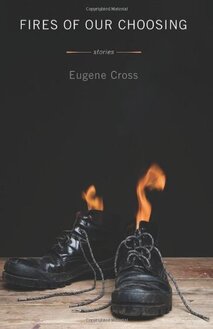With most of Eugen's stories taking place in his home-region of up-state Pennsylvania, his characters and their predicaments are very much tied to their surroundings. Much emotional energy is drawn around this through looks exchanged at bonfires, cold nights spent in lonely dive bars, and romances beginning and ending at a peninsula reaching into Lake Erie. Cross seems to like baiting the reader into projection. In many of his stories, you are nestled into a seemingly clean and simply-sequenced narrative only for your expectations to be shattered by some kind of unforeseeable event. In “Come August,” Megan, the protagonist, is preoccupied with boy problems and anticipation of going away to college for the first time. While babysitting her half sister and a neighborhood girl, Megan briefly falls asleep. When she wakes up, her concerns—which the reader has not only invested his or her self in, but also anticipates an outcome from—disintegrate when she finds the two girls have drowned in the pond in her back yard. This transition in the plot gives the reader a violent jerk from the relative comfort of melodrama to the all-too-real panic of death. We are then, through our own past acts of similar negligence, left to take on Megan’s guilt. By doing this, we are finally brought to grant forgiveness through a pragmatic sympathy that Cross adeptly puts into us like a spell.
Megan isn’t the only bait for projection in Fires of our Choosing. Cross constructs another trap in a sixth grade boy in “Rosaleen, If You Know What I Mean.” In it, Marty brutally beats a boy up at school and, after being expelled, is forced to take anger management classes and eventually give an apology to the boy he assaulted. As you are instantly tempted to hate Marty, you progressively gain more empathy for him as he is left alone by his distant mother, fleeting brother, and father who has died the year before. We get to see the broken state of him and his mother’s relationship from their dinners spent “in front of the TV with the sound turned low, Vanna White floating back and forth across the screen as though observing them” and their sparse interaction that was “anchored only by those times when she had to drop Marty off at school or pick him up.” As the story goes on, Cross reveals Marty’s act of violence as not so much an act of heartless sadism, but a confused and desperate attempt to feel recognition or significance. Whole-heartedly, Cross manages to make us look at ourselves through Marty—forcing us to reevaluate the character of at least one person whom we may have damned for such actions as his. This book shines at its best with Cross’s keen understanding of life-disappointment in the story, “Hunters.” In it, he writes of the defeated wives of bar frequenters who quietly get out of bed to pick their husbands up at closing time: There were rarely any women at Hunters, except for the wives of a few husbands at closing. These were women who stood in the doorway silently, hair mussed from sleep, long winter coats held shut over fraying nightgowns. Their faces were aged with the stoic acceptance of their lots, and they would wait until their husbands finished the drinks they had in front of them, unseated themselves clumsily from their stools, and collected their change and cigarettes from the bar. There is an acute level of perception that makes this conveyance so powerful. Perhaps it’s in Cross’s sensitivity: he is moved and rattled by the things most people keep only in the corners of their eyes and the back of their minds. We see these women picking up their husbands, shopping for their groceries and sitting home all alone on Saturday nights in front of televisions all the time, but they seem to slip between the cracks of our concerns. Cross, however, highlights their gloom with an honest air of sympathy and consideration that shines brightly in his writing. Fires of Our Choosing demonstrates Eugene Cross’s more inviting understanding of the human experience: one that embraces and humanizes those souls who so often get lost in this world’s confusing grid of morality and unforgiving histories of our decisions. If this success of a debut speaks for what is to come from Eugene Cross, it might be useful to remember his name now.
0 Comments
Leave a Reply. |
Archives
April 2024
Categories
All
|
|
Glassworks is a publication of Rowan University's Master of Arts in Writing 260 Victoria Street • Glassboro, New Jersey 08028 glassworksmagazine@rowan.edu |
All Content on this Site (c) 2024 Glassworks
|


 RSS Feed
RSS Feed
